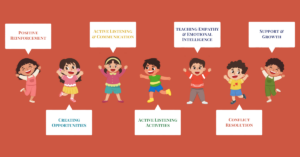
Have you ever taken your child to the park and noticed how they interacted with others? It’s fascinating to see them handling social situations, isn’t it? At Basal Therapies, we understand how these interactions can shape a child’s future. Developing social engagement early in life is vital to becoming a confident adult. It helps foster empathy, effective communication, and conflict resolution abilities that will serve a child well for the rest of their life.
Some children may face social challenges due to shyness, anxiety, or difficulty understanding social cues. All of these can impact their ability to make friends, communicate effectively, and function appropriately in various social situations. If you’re wondering how to strengthen social engagements in your child, you can start by offering opportunities for social interaction, teaching them how to express their emotions, and modeling positive social behaviors. By actively supporting and encouraging your child’s social development, you can help them build the confidence and skills they need to thrive in social settings. Let’s explore seven engaging strategies on how to strengthen social engagements and nurture your child’s social development!
The Power of Positive Reinforcement
One of the most effective ways to encourage positive social behavior in children is through the power of reinforcement. When we acknowledge and celebrate moments of sharing, cooperation, and kindness, we make them more likely to recur. Small gestures go a long way toward positively shaping a child’s social interactions, whether it’s a high-five, a sticker chart, words of praise, or a little reward. Remember, as your child is working out how to strengthen social engagements, consistency is the key to helping this desired behavior become ingrained in them.
Creating Opportunities for Social Interaction
Like muscles, social supports strengthen with regular exercise. We recommend providing children with many different opportunities for social interaction away from the classroom. Organizing playdates, enrolling them in group activities or clubs, or simply attending community events exposes them to various social scenarios to help them build confidence and adaptability. As they become more confident, parents can encourage children to take the bigger step of initiating conversations and joining activities independently. This empowers them to manage social situations on their own.
Need help finding opportunities for social interaction? Keep an eye on our website for upcoming group programs or simply reach out with a question. We’re happy to help!
Developing Active Listening and Communication Skills
Effective communication begins with active listening. Engaging children in activities that promote attentive listening and clear expression is vital for their social development. From interactive storytime sessions to playful games like the “telephone game,” there are numerous fun ways to hone these skills. Encourage your child to express their thoughts and feelings openly, fostering mutual understanding and respect. Remember, communication is a two-way street. Demonstrate active listening to set a positive example for your child.
Active Listening Activities
Fully concentrating on what a speaker is saying, understanding their message, and then responding is a fundamental social support that can be honed through interactive activities. Playing games like “Simon Says” or “I Spy” as part of your daily routine encourages attentive listening and following instructions. As you’re teaching them how to strengthen social engagements, create opportunities for your child to practice paraphrasing or summarizing what they’ve heard. This practice reinforces their listening comprehension and communication skills at the same time. Be sure to encourage them to engage in active listening activities throughout the day. During everyday conversations, showing genuine interest in what they say and validating their thoughts and feelings is beneficial too as it teaches them how to express themselves and how to respond to others when they’re speaking.
Teaching Empathy and Emotional Intelligence
Empathy is the cornerstone of meaningful relationships. By discussing emotions in stories or movies and modeling them ourselves, we can help our children understand and respect others’ feelings. This will also cultivate kindness, compassion, and a deeper connection with those around us. Encourage your child to consider others’ perspectives and feelings because this will help them build stronger interpersonal connections. This ability to recognize and understand one’s own emotions, as well as the emotions of others, is referred to as “emotional intelligence.” Developing this through empathy can lead to improved communication skills and a greater understanding of others’ emotions.
Conflict Resolution for Kids
As you’re discovering how to strengthen social engagements, it’s important to remember that nobody gets along with everyone 100% of the time. Some conflict is inevitable. Learning how to approach disagreement constructively is a valuable skill. Conflict resolution for kids teaches them strategies to resolve disputes peacefully and respectfully. As a parent, you can help your child by encouraging them to express their feelings calmly, listen actively to others’ perspectives, and brainstorm solutions collaboratively.
Role-playing scenarios or using storytelling can make learning these skills engaging and relatable. Remember, these are opportunities for growth and understanding. Look at moments of conflict resolution for kids as teachable moments to reinforce your child’s positive social behavior.
You can learn more about conflict resolution using this helpful article from the Child Mind Institute.
Support and Growth
Supporting your child as they learn how to strengthen social engagements is a journey of growth and memorable moments. We’re committed to supporting parents on this path by offering practical strategies and encouragement along the way. Remember, building social skills takes time and patience, but the rewards are worth it. Let’s continue cultivating kindness, empathy, and resilience in the next generation, one interaction at a time. For more information, contact us. We’re looking forward to helping your child blossom into a confident, socially adept individual!









